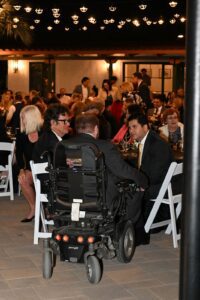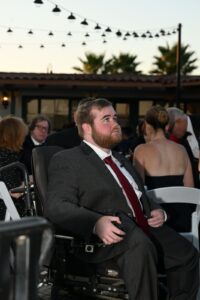Rare Community Profiles

Rare Community Profiles is a Patient Worthy article series of long-form interviews featuring various stakeholders in the rare disease community, such as patients, their families, advocates, scientists, and more.
Destroy Duchenne: How Elijah Stacy is Working to Improve the Lives of People with Duchenne Muscular Dystrophy
22-year-old Elijah Stacy has a passion for catalyzing change.
By blending his personal experience with his love of business, he hopes to create a world where suffering is minimized—and human prosperity is propelled forward.
Elijah moves towards this goal with vigor. He is an author, a public speaker, a consultant, and an advocate—not just for himself, but for the entire Duchenne muscular dystrophy (DMD) community.

Elijah was diagnosed with DMD at just six years old. Since then, he has tirelessly pursued both a cure and increased research, founding a 501(c)(3) nonprofit organization called Destroy Duchenne and sharing his story far and wide to combat adversity.
Elijah’s Story
Duchenne muscular dystrophy is a rare muscle-wasting disease and one of nine forms of muscular dystrophy. Genetic mutations prevent people with DMD from creating enough dystrophin in their muscles, which leads to muscle weakness. Typically, symptoms begin to manifest between ages four and six.
For Elijah, his muscle weakness began in early childhood, culminating in a diagnosis at just six years old. During this time, his family was also facing another health challenge with Elijah’s younger brother Max, who was three years younger. In a beautiful and powerful Instagram tribute to Max, Elijah explains:
“Max, as a baby, had a failed heart surgery that led to a massive stroke and left him severely disabled. Later in his life, we would learn that Max has DMD, which, in my opinion, greatly explains why he didn’t do well with surgery.”
As Elijah grappled with his diagnosis and his changing condition, he also placed a great deal of importance on being a good older brother, which continues to drive him to this day.
Elijah’s muscle weakness began to progress. By age eleven, he began using a power wheelchair full-time for mobility. This was challenging, both physically and mentally. Elijah explains:
“When you have a wheelchair, you’re going to face judgment from the general public. People may look at you differently. I had to learn to adapt to that and overcome it, but it was definitely tough. I was facing these dramatic life changes, and having a wheelchair right before starting middle school meant I would stand out. I didn’t feel like I would fit in. That is one of the harder challenges of DMD that goes unrecognized: the social aspect.”
Another challenge, he shares, is that many people often have misconceptions about what it means when someone is in a wheelchair. He says:
“Many people assume that, because I’m in a wheelchair, I have mental disabilities as well. I’ve seen people in wheelchairs who are disenfranchised because people won’t talk to them directly; waiters will ask the person next to them what they want, for example, and not let someone speak for themselves. There is no knock-on people with mental or cognitive disabilities, but I think people have a very distinct idea of what a wheelchair means that isn’t accurate. There are tons of successful people and brilliant minds in wheelchairs. I also think that the wheelchair doesn’t do justice to how terrible of a disease this is. It’s really easy to look at someone with DMD and think it’s terrible that they can’t walk. But when you’re using mobility and your core, and you once experienced it and it’s going away, that’s hard to understand.”

Learning and Growing with Family
By the time Elijah was entering middle school, his younger brother Kai had been born, and the family would later learn that Kai, too, had Duchenne muscular dystrophy.
As time progressed, Elijah began grappling with the impact of living with Duchenne muscular dystrophy. In his late teenage years, he began to experience upper limb weakness. Suddenly, it was harder to eat, to reach for things, to comb his hair, and brush his teeth. He shares:
“Living with Duchenne makes it much harder to be independent. But I’ve found ways to carve out space for me to complete tasks how I want. For example, the way I get out of bed is still completely independent. I’ve even taught that to Kai, so he can do it now. I engineered the shower. There are ways to still maintain that sense of self.”
As he has navigated this space, Elijah has also been able to pass down his lessons to Kai. While he acted as an amazing big brother to Max as well, Max unfortunately passed away at age 14.
Sometimes Kai will receive a rude or ignorant comment about his wheelchair, which can be upsetting. Elijah does his best to provide Kai with comfort and support. He says:
“I really believe in being a leader and a mentor. Within my family, I see myself as going first through the door of Duchenne, suffering, and adversity, then encouraging Kai to follow suit. I want him to see himself as worthy because he is, and to have high self-esteem. We are not disabled people. We are people who happen to have disabilities. Making sure to keep that perspective does a lot of good for mental health.”
Becoming an Advocate: Destroy Duchenne
As he helped his family, Elijah also had a nagging desire that he could help others—he could change the world—if he only found the right outlet.
The inspiration came at fifteen years old while attending a DMD fundraiser at a theater. He flipped through the booklet given to attendees and was struck by what he saw:
“Everything I read explained the DMD progression and said that this disease is incurable and typically fatal by mid-to-late-20s. I took that as a challenge; I wanted to get into the game and see what I could do. One week later, I founded and launched Destroy Duchenne.”
Destroy Duchenne provides comprehensive support to people and families affected by Duchenne muscular dystrophy. Elijah’s personal experience has taught him that living with DMD is expensive, so his goal is to lessen the economic burden for families, advance science, and raise awareness. Through Destroy Duchenne, families can receive ramps, wheelchairs, and other necessary equipment.
Recently, Destroy Duchenne held its first gala on October 14, 2023. Elijah shares:
“Through the gala, I wanted to bring people together from all walks of life to unite about Duchenne, share information, and understand where we are at. I feel like a lot of information stays within the DMD community, and I wanted to amplify it. I also believe that the disease needs a face, and I’m here to be that face.”
Gala attendees included Riverside County Supervisor Karen Spiegel, Riverside County District Attorney Michael Hestrin, Capricor Therapeutics’ Dr. Linda Marban, and California State Assembly Member Bill Essayli. Satellos Bioscience also spoke about their drug program, and Elijah was recognized by the California Legislature with an Assembly Resolution.

Satellos and Capricor
In addition to his advocacy work through Destroy Duchenne, Elijah hopes to make an impact through his consultancies with Satellos Bioscience and Capricor Therapeutics. He feels that acting as a consultant is extremely imperative because it highlights the patient and community needs.
As a consultant, Elijah explains:
“I speak with people in the media. I also talk with both organizations to represent the patient experience and why we need new drugs. It’s one thing to read about something in a textbook. But to really hear from the person who has that experience, that’s more powerful. For example, something I know people worry about is heart muscle weakness and cardiomyopathy. You live your life with those fears in the back of your mind, and drug developers should know that.
I also believe that losing mobility in your arms is worse than losing mobility in your legs, but there are currently no drugs that preserve upper-limb function in a meaningful way. Translating these insights for drug developers helps to create more targeted therapeutics.”
Elijah’s input has assisted in driving drug programs forward in a way that is most important for those affected. For example, Capricor has been developing CAP-1002 to slow disease progression in DMD. Clinical trials are ongoing to attenuate the progression of upper-limb and cardiac function.
A Small If
While his advocacy work is inspiring and has clearly made a change for many people and families, Elijah also aims to reach the community through sharing his story—and making space for others to share theirs.
At 17 years old, Elijah wrote his memoir, A Small If. One year before, to avoid agonizing surgery, Elijah had to endure enough physical therapy to change the shape of his spine. It had never been done before, but his doctor gave him a small “if.”
In his memoir, Elijah shared thirteen life lessons that he had learned about living a more fulfilling, meaningful life. He hopes to help people overcome extreme suffering by developing an adapter’s mindset and realizing that some things are out of your control. An Adapter’s Mindset, he explains, means that:
“You’re going to adapt to whatever obstacle comes your way. Getting into bed may be harder, but you’re going to adapt to that challenge. You’ll probably need a wheelchair-accessible car now, but you’ll adapt. You can still get from Point A to Point B. Think creatively and adapt. I really do believe that the right philosophy and mindset do wonders for dealing with this disease. It’s how you think and respond to it that makes your quality of life be what it is. This mindset was very helpful to me because a lot of this is out of my control. But things like my attitude or what I do about it are in my control, so that’s what I focus on. In my book, I also discuss self-image and how you see yourself. I see myself as an author, not just a disabled author. A public speaker who happens to have Duchenne. My friends genuinely forget that I’m in a wheelchair sometimes, and I think it’s because of how I act. How you see yourself translates to others, and happy people tend to look better.”
In the end, Elijah believes that the most important element of thriving with DMD is to have hope. He has hope because of what companies are doing and what works synergistically together. He has hope that things will get better. He has hope that by taking life one day at a time, staying positive, and persevering, things will get better. And to everyone else who is going through this, he says:
“We’ll get through it together. You’re not alone.”


